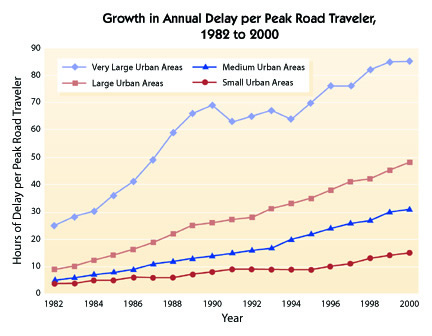| Skip
to content |
|
|
|
Operations Performance MeasurementThis publication is an archived publication and may contain dated technical, contact, and link information.Performance Measurement ChallengesThe future of effective congestion mitigation hinges on the ability to reshape transportation agencies into 21st century operating cultures that facilitate the use of 21st century technologies, continuously collaborate with other agencies, and monitor system performance. This means moving to operational policies and procedures that are proactive, customer-focused, regional, systems-oriented, performance-based, and 24/7 in nature. It means linking congestion management initiatives to system performance rather than remediation of spot problems. It means congestion management is real-time system management and operations, where information on traffic, weather, incidents, and other disruptions are rapidly detected, shared, and used to optimize transportation system performance. 
System Performance Monitoring is vital to Congestion Mitigation D Performance Data OpportunitiesTraditional efforts to measure congestion levels are based on indirect observations: volumes and roadway capacity are used to infer congestion levels. These sources of information have served the transportation profession reasonably well in developing major capital programs, the focus of highway investments until recently. However, modeling and anecdotes hardly comprise the comprehensive performance-monitoring program needed today. This is particularly true as the profession moves into a management and operations (M&O) approach to transportation investments. Traditional information sources are inadequate to capture the often subtle changes in system performance yielded by M&O strategies. Twenty-first century operations require knowledge of system conditions in real time or near-real time. As a result, a wide variety of detailed data must be collected by surveillance systems; these include traffic flow, weather conditions, traffic incidents, and presence of work zones and special events. Once archived, these data provide a powerful resource for a variety of applications, of which performance monitoring is only one. In other words, the existence of operational data provides the transportation industry with the means to conduct performance monitoring cost-effectively. Performance measurement is synonymous with sound business practice. The private sector has been monitoring performance as a way to assess performance in existing markets, evaluate future markets and investment decisions, and determine customer satisfaction. The transportation industry is beginning to monitor system performance for similar reasons. Elected officials and the general public use performance measures to gauge system effectiveness and to hold transportation agencies accountable for the management of one of our country's most vital resources. Performance Measurement ActivitiesWorking with our State and local partners, the Federal Highway Administration's (FHWA) Office of Operations has carried out an aggressive program to measure the sources and consequences of congestion and to analyze the effectiveness of operations strategies to reduce that congestion. This work led us to conclude that travel time and travel time reliability are the most effective measures of the performance of the system from the user's perspective. The recent emphasis on travel time reliability - and the positive effect that 21st century operations can have on making travel times reliable - is a primary example of the need for more detailed performance monitoring. FHWA has been using three performance measurement activities to monitor national congestion trends and system performance. The first of these is the Texas Transportation Institute (TTI) Urban Mobility Study (UMS), which has been in existence since 1982. The UMS tracks congestion patterns in 75 of the largest metropolitan areas. The UMS uses the average annual daily traffic (AADT) and number of lanes data in the Highway Performance Monitoring System as a basis for its estimates. These are then translated into congestion metrics using predictive equations that have been developed and tested specifically for the UMS.  The TTI Mobility Monitoring Program (MMP) calculates system performance metrics based on data archived at traffic management centers (TMCs). These data are highly detailed measurements from roadway surveillance equipment installed for operational purposes. In 2001, 21 cities participated in the MMP, and beginning in 2002, incident data is being collected from TMCs where these data exist. The Urban Congestion Report (UCR) yields a monthly snapshot of roadway congestion in 10 urban areas and three national composite measures. UCR utilizes efficient, automated data collection procedures to obtain travel time directly from traveler information Web sites. Since a monthly report can be rapidly constructed, UCR serves as an early warning system for changes in urban roadway congestion. The UCR can also obtain Web-based data on weather conditions, incidents, and work zone activity. This provides information not only on congestion levels, but also on a range of possible contributing factors.
Future Direction in Performance MeasurementThe FHWA Performance Measurement Program includes the development of methods to measure travel time and reliability, the factors affecting travel time and reliability, and the performance of specific traffic management strategies involving incidents, adverse weather, work zones, and movement of freight. FHWA will provide guidance, technical assistance, and training to advance the state-of-the-practice of system performance measurement in the transportation industry. A primary program objective is to support development of national guidelines in performance data collection. In conjunction with the development of data archiving systems, these will make powerful decision support tools for transportation agencies as they adopt "21st Century Operations using 21st Century Technologies." For more information about Operations Performance Measurement, visit https://ops.fhwa.dot.gov/perf_measurement/index.htm For more information on FHWA Office of Operations activities, visit our web site at https://www.fhwa.dot.gov/operations April 2004 FHWA-OP-04-039
|
|
United States Department of Transportation - Federal Highway Administration |
Last modified: February 22, 2017 | |